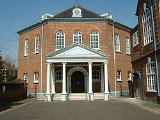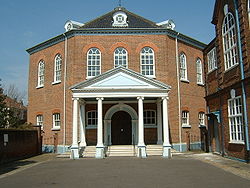
Theophilus Browne
Encyclopedia
Theophilus Browne was a Unitarian
clergyman who was born in 1763 in Derby
, England
. He had a varied career, with a congregation once paying him to leave a chapel. He also proposed that church funds could be improved using state lotteries.
after achieving the degrees of both a Bachelor
and Master of Arts at Christ's College, Cambridge
. He became a fellow of Peterhouse College on 15 July 1785 and he took up the college living
of Cherry Hinton
, Cambridgeshire
in December 1793. He resigned after adopting the positions of the Priestley
school of Unitarians
.
 Browne became minister of the presbyterian congregation at Warminster
Browne became minister of the presbyterian congregation at Warminster
in 1800. In 1807 he left Warminster after quarrelling with the congregation there for the post of classical and mathematical tutor at Manchester College
, York
. At midsummer, 1809, Browne left York to become minister of the Octagon Chapel
, Norwich
. He had preached at Norwich as a candidate in the previous January, and appears to have dissatisfied the college authorities by doing so without notice to them. His ministry at Norwich was unhappy ; he is said to have magnified his office and not to have understood the dislike of his congregation to anything in the shape of a dogmatic creed. He took his stand upon his vested right to a small endowment, and was paid for his resignation at the end of 1810. He did not at once leave Norwich. A letter from him, dated Colgate, Norwich, 10 March 1812, appears in the Monthly Repository, in which he says he will be at liberty to take a congregation at the end of March, and offered to go on a six months' trial.
from 1812 to 1814. For a short time he acted as a supply at Chester
, but removed to Barton Street Chapel, Gloucester
, in 1815. He established a fellowship fund at Gloucester
on 1 November 1818, and a year or two afterward created some consternation by proposing that church funds should be invested in state lotteries, with a view to gaining windfalls for denominational purposes.
He remained at Gloucester till the close of 1823. From this time he resided at Bath, preaching only occasionally. He took great interest in education, and was president of the Mechanics Institute
in Bath.
Anne Browne, his wife, who was three years older than he was, died on Christmas Day in 1834. Browne died, after a short illness, on 20 May 1835 and was buried at Lyncomb Vale, near Bath. There is a tablet to his memory in Trim Street Chapel, Bath.
Besides these he edited:
Unitarianism
Unitarianism is a Christian theological movement, named for its understanding of God as one person, in direct contrast to Trinitarianism which defines God as three persons coexisting consubstantially as one in being....
clergyman who was born in 1763 in Derby
Derby
Derby , is a city and unitary authority in the East Midlands region of England. It lies upon the banks of the River Derwent and is located in the south of the ceremonial county of Derbyshire. In the 2001 census, the population of the city was 233,700, whilst that of the Derby Urban Area was 229,407...
, England
England
England is a country that is part of the United Kingdom. It shares land borders with Scotland to the north and Wales to the west; the Irish Sea is to the north west, the Celtic Sea to the south west, with the North Sea to the east and the English Channel to the south separating it from continental...
. He had a varied career, with a congregation once paying him to leave a chapel. He also proposed that church funds could be improved using state lotteries.
Biography
Browne was born in Derby in 1763. He took holy ordersHoly Orders
The term Holy Orders is used by many Christian churches to refer to ordination or to those individuals ordained for a special role or ministry....
after achieving the degrees of both a Bachelor
Bachelor of Arts
A Bachelor of Arts , from the Latin artium baccalaureus, is a bachelor's degree awarded for an undergraduate course or program in either the liberal arts, the sciences, or both...
and Master of Arts at Christ's College, Cambridge
Christ's College, Cambridge
Christ's College is a constituent college of the University of Cambridge.With a reputation for high academic standards, Christ's College averaged top place in the Tompkins Table from 1980-2000 . In 2011, Christ's was placed sixth.-College history:...
. He became a fellow of Peterhouse College on 15 July 1785 and he took up the college living
Advowson
Advowson is the right in English law of a patron to present or appoint a nominee to a vacant ecclesiastical benefice or church living, a process known as presentation. In effect this means the right to nominate a person to hold a church office in a parish...
of Cherry Hinton
Cherry Hinton
Cherry Hinton is a suburban area of the city of Cambridge, in Cambridgeshire, England. It is around southeast of Cambridge city centre.-History:...
, Cambridgeshire
Cambridgeshire
Cambridgeshire is a county in England, bordering Lincolnshire to the north, Norfolk to the northeast, Suffolk to the east, Essex and Hertfordshire to the south, and Bedfordshire and Northamptonshire to the west...
in December 1793. He resigned after adopting the positions of the Priestley
Joseph Priestley
Joseph Priestley, FRS was an 18th-century English theologian, Dissenting clergyman, natural philosopher, chemist, educator, and political theorist who published over 150 works...
school of Unitarians
Unitarianism
Unitarianism is a Christian theological movement, named for its understanding of God as one person, in direct contrast to Trinitarianism which defines God as three persons coexisting consubstantially as one in being....
.
Warminster and Norwich

Warminster
Warminster is a town in western Wiltshire, England, by-passed by the A36, and near Frome and Westbury. It has a population of about 17,000. The River Were runs through the town and can be seen running through the middle of the town park. The Minster Church of St Denys sits on the River Were...
in 1800. In 1807 he left Warminster after quarrelling with the congregation there for the post of classical and mathematical tutor at Manchester College
Harris Manchester College, Oxford
Harris Manchester College is one of the constituent colleges of the University of Oxford in the United Kingdom. Formerly known as Manchester College, it is listed in the University Statutes as Manchester Academy and Harris College, and at University ceremonies it is called Collegium de Harris et...
, York
York
York is a walled city, situated at the confluence of the Rivers Ouse and Foss in North Yorkshire, England. The city has a rich heritage and has provided the backdrop to major political events throughout much of its two millennia of existence...
. At midsummer, 1809, Browne left York to become minister of the Octagon Chapel
Octagon Chapel, Norwich
The Octagon Chapel is a Unitarian Chapel located in Colegate in Norwich, Norfolk, England. It is home to a growing liberal religious community, welcoming people of all religious faiths and none. The congregation is a member of the General Assembly of Unitarian and Free Christian Churches.The chapel...
, Norwich
Norwich
Norwich is a city in England. It is the regional administrative centre and county town of Norfolk. During the 11th century, Norwich was the largest city in England after London, and one of the most important places in the kingdom...
. He had preached at Norwich as a candidate in the previous January, and appears to have dissatisfied the college authorities by doing so without notice to them. His ministry at Norwich was unhappy ; he is said to have magnified his office and not to have understood the dislike of his congregation to anything in the shape of a dogmatic creed. He took his stand upon his vested right to a small endowment, and was paid for his resignation at the end of 1810. He did not at once leave Norwich. A letter from him, dated Colgate, Norwich, 10 March 1812, appears in the Monthly Repository, in which he says he will be at liberty to take a congregation at the end of March, and offered to go on a six months' trial.
Congleton
He was minister at CongletonCongleton
Congleton is a town and civil parish in the unitary authority of Cheshire East and the ceremonial county of Cheshire, England, on the banks of the River Dane, to the west of the Macclesfield Canal and 21 miles south of Manchester. It has a population of 25,750.-History:The first settlements in...
from 1812 to 1814. For a short time he acted as a supply at Chester
Chester
Chester is a city in Cheshire, England. Lying on the River Dee, close to the border with Wales, it is home to 77,040 inhabitants, and is the largest and most populous settlement of the wider unitary authority area of Cheshire West and Chester, which had a population of 328,100 according to the...
, but removed to Barton Street Chapel, Gloucester
Gloucester
Gloucester is a city, district and county town of Gloucestershire in the South West region of England. Gloucester lies close to the Welsh border, and on the River Severn, approximately north-east of Bristol, and south-southwest of Birmingham....
, in 1815. He established a fellowship fund at Gloucester
Gloucester
Gloucester is a city, district and county town of Gloucestershire in the South West region of England. Gloucester lies close to the Welsh border, and on the River Severn, approximately north-east of Bristol, and south-southwest of Birmingham....
on 1 November 1818, and a year or two afterward created some consternation by proposing that church funds should be invested in state lotteries, with a view to gaining windfalls for denominational purposes.
He remained at Gloucester till the close of 1823. From this time he resided at Bath, preaching only occasionally. He took great interest in education, and was president of the Mechanics Institute
Mechanics' Institutes
Historically, Mechanics' Institutes were educational establishments formed to provide adult education, particularly in technical subjects, to working men...
in Bath.
Anne Browne, his wife, who was three years older than he was, died on Christmas Day in 1834. Browne died, after a short illness, on 20 May 1835 and was buried at Lyncomb Vale, near Bath. There is a tablet to his memory in Trim Street Chapel, Bath.
Publications
- Eight Forms of Prayer for Public Social Worship, Bath, 1803
- Plain and Useful Selections from the Books of the Old and New Testament, 1805, 8vo (intended as a lectionary, but not much esteemed ; Browne projected a sequel to be taken from the apocrypha).
- Religious Liberty and the Rights of Conscience and Private Judgment grossly violated,, 1819, The terms in which he dedicated this pamphlet to the Rev. Thomas BelshamThomas BelshamThomas Belsham was an English Unitarian minister- Life :Belsham was born in Bedford, England, and was the elder brother of William Belsham, the English political writer and historian. He was educated at the dissenting academy at Daventry, where for seven years he acted as assistant tutor...
, gave offence to his fellow utilitarians.
Besides these he edited:
- Select parts of William MelmothWilliam MelmothWilliam Melmoth was an English devotional writer and lawyer, whose major work, The Great Importance of a Religious Life Consider'd , proved to be one of the most popular pieces of religious writing of the 18th century.Melmoth was admitted to the Inns of Court to begin his training as a barrister...
's Great Importance of a Religious Life (originally published in 1711). - A selection of 'Sermons '(1818, 12mo) by Joshua ToulminJoshua ToulminJoshua Toulmin of Taunton, England was a noted theologian and a serial Dissenting minister of Presbyterian , Baptist , and then Unitarian congregations...
, D.D. - Devotional Addresses and Hymns (1818, 12mo), by William Russell of Birmingham.

